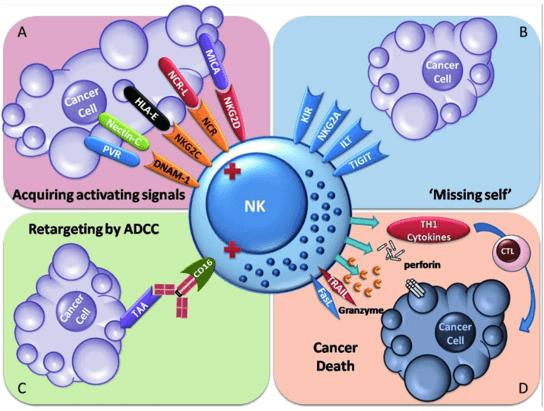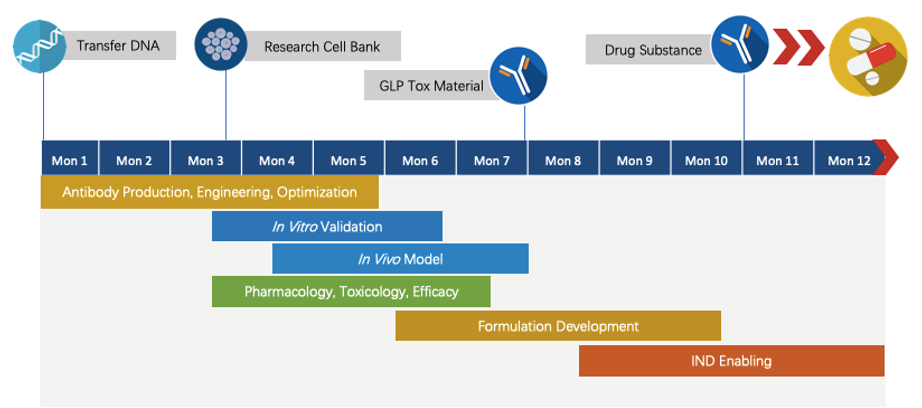Next-IO™ Anti-PVR Monoclonal Antibody Program
After years of research, immunotherapy has revolutionized so much. The monoclonal antibody therapy is one of the developments that bring hope to many patients in need. As an experienced CRO offering a wide range of discovery and development services, Creative Biolabs now proposes to develop Next-IO™ Anti-PVR Monoclonal Antibody Program. We are seeking potential partners to join the journey.
Background
As a key innate immune cell, natural killer (NK) cell is related with the elimination of infected cells. It has been demonstrated that dysfunctional NK cells are associated with increased tumor incidence in both clinical studies and pre-clinical in vivo studies. NK cells induce anti-tumor responses through several different mechanisms: (1) Decreased MHC class I antigen on tumor cells induces NK cell activation through the lack of inhibitory signals, which is a pathway important for self-tolerance; (2) The expression level of stress-induced NK cell activation receptor ligands, which is response important for NK cell to recognize the stressed cells; (3) Activation of NK cell-mediated ADCC activity through tumor-associated antigen-specific mAb (see Fig.1). In patients with cancers, their immune system and anti-tumor immunity are inhibited. To improve the anti-tumor ability of own immune system, the functions of NK cells need to be restored. From this, we propose this program to target PVR to block the inhibitory signals of NK cells.
 Fig.1 Immune surveillance of cancer by natural killer (NK) cells.1
Fig.1 Immune surveillance of cancer by natural killer (NK) cells.1
Our Anti-PVR Antibody Program
Poliovirus receptor (PVR), also known as CD155 and necl-5, was originally identified as a receptor of poliovirus. It’s expressed only at a low level in a variety of normal human tissues. But, it is overexpressed in tumor cells and associated with poor prognosis in tumor progression. As a ligand for the inhibitory receptor - CD96, PVR is identified to mediate the tumor immune escape. From this, PVR is considered as a potential target for cancer immunotherapy treatment. Our anti-PVR mAb program aims to develop the therapeutic antibody against PVR to restore the NK cell anti-tumor activity via suppressing inhibitory signals of CD96. Other than monoclonal antibody developments, if you are interested in combination strategies, or other antibody modalities, such as a bispecific antibody, etc., please feel free to reach out to our scientists for further assistance.
Published Data
-
CD155 is a ligand of CD96.
-
CD96 is demonstrated to suppress NK cell function via binding with CD155.
-
Expression of PVR is associated with poor prognosis.
-
Inverse correlation between tumor CD155 status and tumor-infiltrating T-lymphocytes.
-
CD155 blockade inhibits the growth of pancreatic cancer cells.
Based on these data, PVR can works as a therapeutic target in tumor immunotherapy for its role in immune functions.
Program Planning and Management
We have extensive experience in performing comprehensive program developments and effective problem-solving. For our Next-IO™ programs, we are committed to providing the program to the pre-IND stage within about 1.5 years. The accurate timeline will be determined on a case-by-case basis. Here is a draft timeline for your glance.
 Fig.2 The timeline of Next-IOᵀᴹ programs.
Fig.2 The timeline of Next-IOᵀᴹ programs.
Collaboration
Creative Biolabs is seeking potential partners to develop this novel therapeutic mAbs against PVR expressed on tumor cells together. Our scientists are dedicated to bringing years of research experience and creative spirits to ensure strategic collaborations. All the risks and costs shall be shared.
If you are interested in our Next-IO™ programs, please feel free to contact us to learn how we can collaborate with each other.
Reference
-
Li, Yangxi, and Rui Sun. "Tumor immunotherapy: New aspects of natural killer cells." Chinese journal of cancer research. 30,2 (2018): 173-196.
For Research Use Only | Not For Clinical Use


 Fig.1 Immune surveillance of cancer by natural killer (NK) cells.1
Fig.1 Immune surveillance of cancer by natural killer (NK) cells.1
 Fig.2 The timeline of Next-IOᵀᴹ programs.
Fig.2 The timeline of Next-IOᵀᴹ programs.
 Download our brochure
Download our brochure